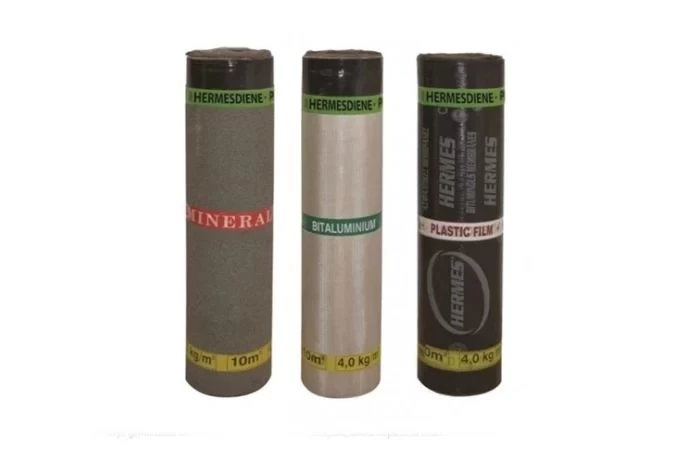From the name it is clear that the main raw material used in the construction of an asphalt membrane is bitumen. The bitumen used for the production of asphaltic membranes may be oxidized bitumen or modified bitumen. In particular:

OXIDISED BITUMEN
Oxidized bitumen (OXY) is the first attempt to improve bitumen by oxidation in order to increase the useful temperature range. Its main disadvantages are sensitivity to UV radiation, low resistance to low temperatures and short life due to ageing of the mixture.
In conclusion, it is not recommended to apply asphaltic membrane on the surface to be waterproofed, especially if waterproofing is the final stage of insulation.
MODIFIED BITUMEN
Bitumen is known for its ability to prevent water infiltration. However, it needs to be modified in order to better withstand temperature changes and drying and to maintain its elasticity even at low temperatures. It is divided into two types:
- Plastomeric: Asphalt can be more plastic by adding APP (unconformable prolypropylamine).
- Elastomeric: Bitumen can be more elastic by adding SBS (styrene-butadiene-styrene) polymers.
In conclusion, these asphalts (APP & SBS) are the ones to be chosen for sealing a surface because they offer a higher degree of elasticity and durability than those of oxidized asphalt.
The main differences between APP & SBS asphaltic membranes are the degree of elasticity (plastomeric and elastomeric) and resistance to low temperatures of the outdoor environment (APP can withstand up to -10 degrees Celsius while SBS can withstand up to -25 degrees Celsius without specific temperature ranges being binding).
Useful Tip: When waterproofing an area of more than 200m2 choose SBS asphaltic membranes instead of APP due to the high degree of stresses due to substrate contraction.
ATTENTION: It has been observed the phenomenon where various crews and craftsmen, in order to make their offer more attractive, propose asphaltic membranes with aluminium coating, without mentioning its type and quality. Thus, on the one hand, in order to be competitive on the market and, on the other hand, because elastomeric bituminous foams with an aluminum coating are very expensive, they apply those of oxidised bitumen.
In addition to the main material of construction (bitumen), asphaltic membanes are divided into categories according to their reinforcement, their weight per square metre and the coating material on the upper part of the membrane.
REINFORCEMENT OF ASPHALTIC MEMBRANES
The reinforcement of asphaltic membranes is a very important element in terms of quality and resistance (to puncturing, tearing, etc.) and the general performance of the waterproofing. The reinforcement of asphaltic membranes is mainly divided into the following categories:
- Glass reinforcement
- Glass fibre reinforcement
- Non-woven polyester
Useful tip: For better durability and performance, prefer asphaltic membranes with reinforcement of the third category.
ATTENTION: In addition to the type, check the weight of the reinforcement. Third class asphaltic membranes may have reinforcement weights from 100gr/m2 to 160-180gr/m2 with the corresponding gradations in both quality and price.
COATING & WEIGHT OF ASPHALTIC MEMBRANES
Asphaltic membranes in terms of weight and thickness range from 2.5kg/m2 to 6kg/m2 with thicknesses from 1.5mm to 5mm.
Depending on the use of the membrane, the top coating can be:
- polyethylene film or sand
- colored mosaic
- Metal sheet (aluminum or copper)
Useful tip: When waterproofing a roof is implemented with a single layer of asphaltic membrane, it is preferable that the weight of the membrane is at least 5kg/m2. If you can afford it, choose without a second thought the waterproofing with a double layer of asphaltic membranes, because research has shown that single layers of asphaltic membranes have twice the injury rate of double layers.

